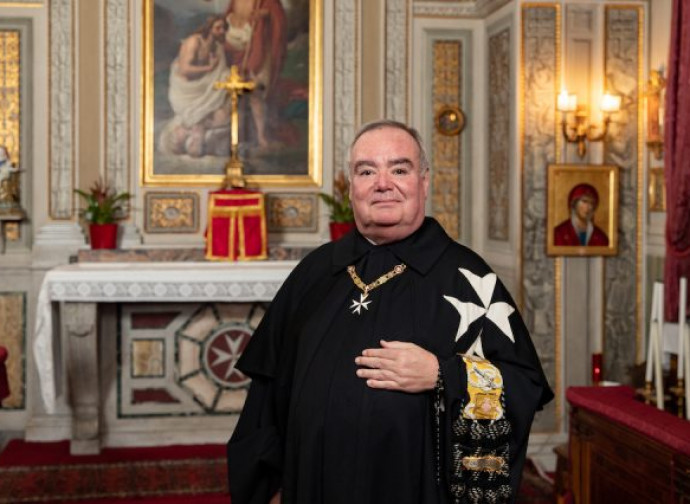The Order of Malta elects Dunlap: renewal and stability
The Lieutenant Grand Master which Pope Francis preferred has been elected to lead the Order for a decade. After several beleaguered years, the choice means there are neither winners nor losers: the path forward was already mapped out and involves reform but also safeguarding religious distinctiveness.

The great day has arrived. At the Magistral Villa situated on the Aventine in Rome, the Council Complete of State met yesterday to choose the new leader of the Sovereign Military Order of Malta. The capitulars had to choose from the names of the trio voted the day before by the professed. A balanced situation had emerged from the consultation between the knights who had cast their perpetual votes, with the Grand Hospitaller, Alessandro de Franciscis virtually neck and neck with the outgoing Lieutenant Fra’ John Dunlap. Lagging behind was the third name, of Englishman Max Rumney.
Yesterday, however, the capitulars chose to award the Canadian religious, the first American to be elected Grand Master, who said he wanted to accept "this appointment with a deep spirit of service and with the solemn promise of constant commitment". After so many upheavals in one of the oldest institutions, this is a sign of continuity with the appointment personally desired by Francis in June 2022 to succeed the late Fra' Marco Luzzago as Lieutenant and confirmed in September with the zeroing of the high offices and the assignment to Dunlap of the leadership of the Order's provisional government.
The Council was preceded by Holy Mass celebrated by the Pope's Special Delegate, Cardinal Silvano Maria Tomasi, and preceded by a procession in which all the 99 participants took part. The meeting took place in a decidedly more serene atmosphere than that seen in recent years following the outbreak of the institutional crisis triggered by the tug-of-war between the former Grand Master, Matthew Festing and the former Grand Chancellor, Albrecht Boeselager.
Today, however, there are no winners nor losers because the Order's path has already been marked out with the promulgation of the new Constitution and Code. It is the path the Pope directed with the indications for the spiritual and moral renewal that should see the light of day with the completion of the reform and the return to ordinary administration thanks to the election of a Grand Master. He will receive a ten-year mandate, with the possibility of being re-elected for another ten years, even though Dunlap himself had explained that the Pope, in making this decision, had envisaged the possibility of a subsequent change.
The election of the Grand Master contributes to giving stability to an institution that has come through difficult years. Just as further stability is due to the outcome of the Extraordinary General Chapter in January, which by electing the members of the Sovereign Council reinforced the Pope's previous appointments. The recent election of this governing team to whom Francis had already given confidence and who have a six-year mandate ahead of them has made it possible to arrive at yesterday's and the day before yesterday's appointment without excessive rivalry or fears of settling scores. Trust that, with the decisive contribution of Cardinals Tomasi and Ghirlanda, was given to the new Government from Santa Marta precisely in recognition of the work done by all its members to pull the Order out of a quagmire that has lasted five years. As already noted, the appointment of one name rather than another to the Magistral Palace was secondary to the question of adherence to the spiritual line marked by the reform.
A proof of the renewal in the Order lies in the election of the Grand Master himself: thanks to the new texts that have done away with the stringent requirements of nobility that existed until recently, it has been possible to widen the pool of those eligible and to choose a figure like Dunlap who can boast noble titles only a few decades old. The 81st Grand Master's religious vocation was born during his years of volunteer work alongside AIDS patients at the Cardinal Cooke Medical Center in Harlem, New York, where he worked as an internationally renowned lawyer. A social service but driven by a religious vocation that led him to profess perpetual vows of poverty, chastity and obedience.
Dunlap's personal story is emblematic of the challenge to which the Order of Malta is called in today's society: not to be one of many NGOs, but to cultivate and preserve its religious distinctiveness. The first test on this front will now be the opening of an international novitiate house. The reform that has been completed has been aimed precisely at providing the SMOM with the tools to do this. The need to strengthen and not loosen the special bond with the Holy See also responds to this end.
